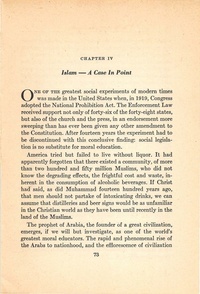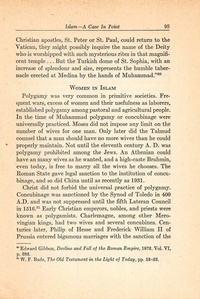This Earth One Country/Islam A case in point
The text below this notice was generated by a computer, it still needs to be checked for errors and corrected. If you would like to help, view the original document by clicking the PDF scans along the right side of the page. Click the edit button at the top of this page (notepad and pencil icon) or press Alt+Shift+E to begin making changes. When you are done press "Save changes" at the bottom of the page. |
CHAPTER IV
Islam — A Case In Point
NE OF THE greatest social experiments of modern times was made in the United States when, in 1919, Congress adopted the National Prohibition Act. The Enforcement Law received support not only of forty-six of the forty-eight states, but also of the church and the press, in an endorsement more sweeping than has ever been given any other amendment to the Constitution. After fourteen years the experiment had to be discontinued with this conclusive finding: social legislation is no substitute for moral education.
America tried but failed to live without liquor. It had apparently forgotten that there existed a community, of more than two hundred and fifty million Muslims, who did not know the degrading effects, the frightful cost and waste, inherent in the consumption of alcoholic beverages. If Christ had said, as did Muhammad fourteen hundred years ago, that men should not partake of intoxicating drinks, we can assume that distilleries and beer signs would be as unfamiliar in the Christian world as they have been until recently in the land of the Muslims.
The prophet of Arabia, the founder of a great civilization, emerges, if we will but investigate, as one of the world’s greatest moral educators. The rapid and phenomenal rise of the Arabs to nationhood, and the efflorescence of civilization
73
[Page 74]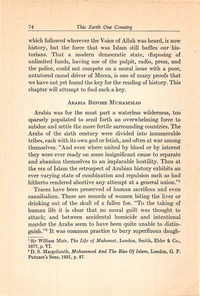 74 This Earth One Country
74 This Earth One Country
which followed wherever the Voice of Allah was heard, is now history, but the force that was Islam still baffles our’ historians. That a modern democratic state, disposing of unlimited funds, having use of the pulpit, radio, press, and the police, could not compete on a moral issue with a poor, untutored camel driver of Mecca, is one of many proofs that we have not yet found the key for the reading of history. This chapter will attempt to find such a key.
AraBiA Berore MunamMMaD
Arabia was for the most part a waterless wilderness, too sparsely populated to send forth an overwhelming force to subdue and settle the more fertile surrounding countries. The Arabs of the sixth century were divided into innumerable tribes, each with its own god or fetish, and often at war among themselves. “And even where united by blood or by interest they were ever ready on some insignificant cause to separate and abandon themselves to an implacable hostility. Thus at the era of Islam the retrospect of Arabian history exhibits an ever varying state of combination and repulsion such as had hitherto rendered abortive any attempt at a general union.”?
Traces have been preserved of human sacrifices and even cannibalism. There are records of women biting the liver or drinking out of the skull of a fallen foe. “To the taking of human life it is clear that no moral guilt was thought to attach; and between accidental homicide and intentional murder the Arabs seem to have been quite unable to distinguish.’’” It was common practice to bury superfluous daugh 1Sir William Muir, The Life of Mahomet, London, Smith, Elder & Co.,
1877, p. VI.
- D.S. Margoliouth, Mohammed And The Rise Of Islam, London, G. P.
Putnam’s Sons, 1931, p. 27.
[Page 75]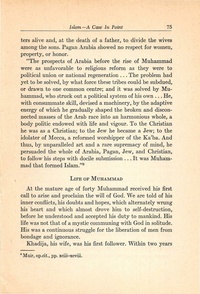 Islam —A Case In Point no
Islam —A Case In Point no
ters alive and, at the death of a father, to divide the wives among the sons. Pagan Arabia showed no respect for women, property, or honor.
“The prospects of Arabia before the rise of Muhammad were as unfavorable to religious reform as they were to political union or national regeneration ...The problem had yet to be solved, by what force these tribes could be subdued, or drawn to one common centre; and it was solved by Muhammad, who struck out a political system of his own .. . He, with consummate skill, devised a machinery, by the adaptive energy of which he gradually shaped the broken and disconnected masses of the Arab race into an harmonious whole, a body politic endowed with life and vigour. To the Christian he was as a Christian; to the Jew he became a Jew; to the idolater of Mecca, a reformed worshipper of the Ka’ba. And thus, by unparalleled art and a rare supremacy of mind, he persuaded the whole of Arabia, Pagan, Jew, and Christian, to follow his steps with docile submission ... It was Muhammad that formed Islam.”
Lirse or MunAmMMAD
At the mature age of forty Muhammad received his first call to arise and proclaim the will of God. We are told of his inner conflicts, his doubts and hopes, which alternately wrung his heart and which almost drove him to self-destruction, before he understood and accepted his duty to mankind. His life was not that of a mystic communing with God in solitude. His was a continuous struggle for the liberation of men from bondage and ignorance.
Khadija, his wife, was his first follower. Within two years
- Muir, op.cit., pp. xciii-xeviii.
[Page 76]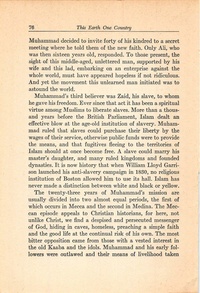 76 This Earth One Country
76 This Earth One Country
Muhammad decided to invite forty of his kindred to a secret meeting where he told them of the new faith. Only Ali, who was then sixteen years old, responded. To those present, the sight of this middle-aged, unlettered man, supported by his wife and this lad, embarking on an enterprise against the whole world, must have appeared hopeless if not ridiculous. And yet the movement this unlearned man initiated was to astound the world:
Muhammad’s third believer was Zaid, his slave, to whom he gave his freedom. Ever since that act it has been a spiritual virtue among Muslims to liberate slaves. More than a thousand years before the British Parliament, Islam dealt an effective blow at the age-old institution of slavery. Muhammad ruled that slaves could purchase their liberty by the wages of their service, otherwise public funds were to provide the means, and that fugitives fleeing to the territories of Islam should at once become free. A slave could marry his master’s daughter, and many ruled kingdoms and founded dynasties. It is now history that when William Lloyd Garrison launched his anti-slavery campaign in 1830, no religious institution of Boston allowed him to use its hall. Islam has never made a distinction between white and black or yellow.
The twenty-three years of Muhammad’s mission are
usually divided into two almost equal periods, the first of
which occurs in Mecca and the second in Medina. The Meccan episode appeals to Christian historians, for here, not
unlike Christ, we find a despised and persecuted messenger
of God, hiding in caves, homeless, preaching a simple faith
and the good life at the continual risk of his own. The most
bitter opposition came from those with a vested interest in
the old Kaaba and the idols. Muhammad and his early followers were outlawed and their means of livelihood taken
[Page 77]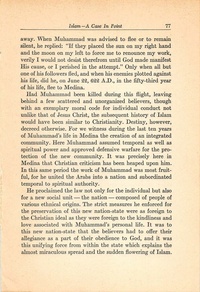 Islam —A Case In Point U7
Islam —A Case In Point U7
away. When Muhammad was advised to flee or to remain silent, he replied: “If they placed the sun on my right hand and the moon on my left to force me to renounce my work, verily I would not desist therefrom until God made manifest His cause, or I perished in the attempt.” Only when all but one of his followers fled, and when his enemies plotted against his life, did he, on June 22, 622 A.D., in the fifty-third year of his life, flee to Medina.
Had Muhammad been killed during this flight, leaving behind a few scattered and unorganized believers, though with an exemplary moral code for individual conduct not unlike that of Jesus Christ, the subsequent history of Islam would have been similar to Christianity. Destiny, however, decreed otherwise. For we witness during the last ten years of Muhammad’s life in Medina the creation of an integrated community. Here Muhammad assumed temporal as well as spiritual power and approved defensive warfare for the protection of the new community. It was precisely here in Medina that Christian criticism has been heaped upon him. In this same period the work of Muhammad was most fruitful, for he united the Arabs into a nation and subordinated temporal to spiritual authority.
He proclaimed the law not only for the individual but also
for a new social unit — the nation — composed of people of
various ethnical origins. The strict measures he enforced for
the preservation of this new nation-state were as foreign to
the Christian ideal as they were foreign to the kindliness and
love associated with Muhammad’s personal life. It was to
this new nation-state that the believers had to offer their
allegiance as a part of their obedience to God, and it was
this unifying force from within the state which explains the
almost miraculous spread and the sudden flowering of Islam.
[Page 78]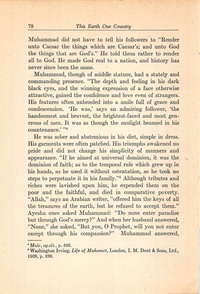 78 This Earth One Country
78 This Earth One Country
Muhammad did not have to tell his followers to “Render unto Caesar the things which are Caesar’s; and unto God the things that are God’s.” He told them rather to render all to God. He made God real to a nation, and history has never since been the same.
Muhammad, though of middle stature, had a stately and commanding presence. “The depth and feeling in his dark black eyes, and the winning expression of a face otherwise attractive, gained the confidence and love even of strangers. His features often unbended into a smile full of grace and condescension. “He was, says an admiring follower, ‘the handsomest and bravest, the brightest-faced and most generous of men. It was as though the sunlight beamed in his countenance.’ ”’*
He was sober and abstemious in his diet, simple in dress. His garments were often patched. His triumphs awakened no pride and did not change his simplicity of manners and appearance. “If he aimed at universal dominion, it was the dominion of faith; as to the temporal rule which grew up in his hands, as he used it without ostentation, so he took no steps to perpetuate it in his family.’ Although tributes and riches were lavished upon him, he expended them on the poor and the faithful, and died in comparative poverty. “Allah,” says an Arabian writer, “offered him the keys of all the treasures of the earth, but he refused to accept them.” Ayesha once asked Muhammad: “Do none enter paradise but through God’s mercy?” And when her husband answered, “None,” she asked, “But you, O Prophet, will you not enter except through his compassion?” Muhammad answered,
“Muir, op.cit., p. 523.
- Washington Irving, Life of Mahomet, London, I. M. Dent & Sons, Ltd.,
1928, p. 238.
[Page 79]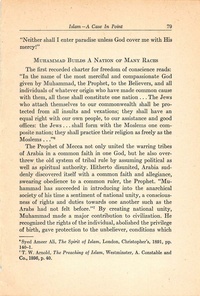 Islam —A Case In Point 79
Islam —A Case In Point 79
“Neither shall I enter paradise unless God cover me with His mercy!”
Musammap Buritpos A Nation or Many Racss
The first recorded charter for freedom of conscience reads: “In the name of the most merciful and compassionate God given by Muhammad, the Prophet, to the Believers, and all individuals of whatever origin who have made common cause with them, all these shall constitute one nation... The Jews who attach themselves to our commonwealth shall be protected from all insults and vexations; they shall have an equal right with our own people, to our assistance and good offices: the Jews... shall form with the Moslems one composite nation; they shall practice their religion as freely as the Moslems ...’”®
The Prophet of Mecca not only united the warring tribes of Arabia in a common faith in one God, but he also overthrew the old system of tribal rule by assuming political as well as spiritual authority. Hitherto disunited, Arabia suddenly discovered itself with a common faith and allegiance, swearing obedience to a common ruler, the Prophet. “Muhammad has succeeded in introducing into the anarchical society of his time a sentiment of national unity, a consciousness of rights and duties towards one another such as the Arabs had not felt before.”” By creating national unity, Muhammad made a major contribution to civilization. He recognized the rights of the individual, abolished the privilege of birth, gave protection to the unbeliever, conditions which
®Syed Ameer Ali, The Spirit of Islam, London, Christopher’s, 1891, pp. 140-1. 77, W. Arnold, The Preaching of Islam, Westminster, A. Constable and
Co., 1896, p. 40.
[Page 80]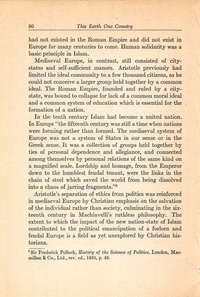 peter 7 This Earth One Country
peter 7 This Earth One Country
had not existed in the Roman Empire and did not exist in Europe for many centuries to come. Human solidarity was a basic principle in Islam.
Mediaeval Europe, in contrast, still consisted of citystates and self-sufficient manors. Aristotle previously had limited the ideal community to a few thousand citizens, as he could not conceive a larger group held together by a common ideal. The Roman Empire, founded and ruled by a citystate, was bound to collapse for lack of a common moral ideal and a common system of education which is essential for the formation of a nation.
In the tenth century Islam had become a united nation. In Europe “the fifteenth century was still a time when nations were forming rather than formed. The mediaeval system of Europe was not a system of States in our sense or in the Greek sense. It was a collection of groups held together by ties of personal dependence and allegiance, and connected among themselves by personal relations of the same kind on a magnified scale. Lordship and homage, from the Emperor down to the humblest feudal tenant, were the links in the chain of steel which saved the world from being dissolved into a chaos of jarring fragments.’®
Aristotle’s separation of ethics from politics was reinforced in mediaeval Europe by Christian emphasis on the salvation of the individual rather than society, culminating in the sixteenth century in Machiavelli’s ruthless philosophy. The extent to which the impact of the new nation-state of Islam contributed to the political emancipation of a forlorn and feudal Europe is a field as yet unexplored by Christian historians.
® Sir Frederick Pollock, History of the Science of Politics, London, Macmillan & Co., Ltd., rev. ed., 1935, p. 49.
[Page 81]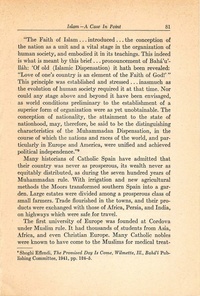 Islam —A Case In Point 81
Islam —A Case In Point 81
“The Faith of Islam ...introduced...the conception of the nation as a unit and a vital stage in the organization of human society, and embodied it in its teachings. This indeed is what is meant by this brief... pronouncement of Baha’u’llah: “Of old (Islamic Dispensation) it hath been revealed: “Love of one’s country is an element of the Faith of God!’ ” This principle was established and stressed ...inasmuch as the evolution of human society required it at that time. Nor could any stage above and beyond it have been envisaged, as world conditions preliminary to the establishment of a superior form of organization were as yet unobtainable. The conception of nationality, the attainment to the state of nationhood, may, therefore, be said to be the distinguishing characteristics of the Muhammadan Dispensation, in the course of which the nations and races of the world, and particularly in Europe and America, were unified and achieved political independence.’
Many historians of Catholic Spain have admitted that their country was never as prosperous, its wealth never as equitably distributed, as during the seven hundred years of Muhammadan rule. With irrigation and new agricultural methods the Moors transformed southern Spain into a garden. Large estates were divided among a prosperous class of small farmers. Trade flourished in the towns, and their products were exchanged with those of Africa, Persia, and India, on highways which were safe for travel.
The first university of Europe was founded at Cordova under Muslim rule. It had thousands of students from Asia, Africa, and even Christian Europe. Many Catholic nobles were known to have come to the Muslims for medical treat
- Shoghi Effendi, The Promised Day Is Come, Wilmette, Ill., Bahd’t Publishing Committee, 1941, pp. 124-5.
[Page 82]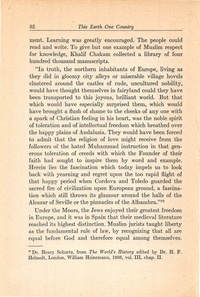 82 This Earth One Country
82 This Earth One Country
ment. Learning was greatly encouraged. The people could read and write. To give but one example of Muslim respect for knowledge, Khalif Chakam collected a library of four hundred thousand manuscripts.
“In truth, the northern inhabitants of Europe, living as they did in gloomy city alleys or miserable village hovels clustered around the castles of rude, uncultured nobility, would have thought themselves in fairyland could they have been transported to this joyous, brilliant world. But that which would have especially surprised them, which would have brought a flush of shame to the cheeks of any one with a spark of Christian feeling in his heart, was the noble spirit of toleration and of intellectual freedom which breathed over the happy plains of Andalusia. They would have been forced to admit that the religion of love might receive from the followers of the hated Muhammad instruction in that generous toleration of creeds with which the Founder of their faith had sought to inspire them by word and example. Herein lies the fascination which today impels us to look back with yearning and regret upon the too rapid flight of that happy period when Cordova and Toledo guarded the sacred fire of civilization upon European ground, a fascination which still throws its glamour around the halls of the Alcazar of Seville or the pinnacles of the Alhambra.”?°
Under the Moors, the Jews enjoyed their greatest freedom in Europe, and it was in Spain that their medieval literature reached its highest distinction. Muslim jurists taught liberty as the fundamental rule of law, by recognizing that all are equal before God and therefore equal among themselves.
Dr. Henry Schurtz, from The World’s History edited by Dr. H. F.
Helmolt, London, William Heinemann, 1908, vol. III, chap. II.
[Page 83]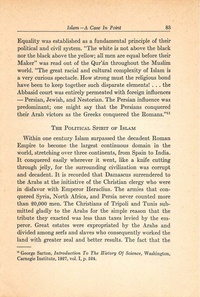 cs
cs
Islam —A Case In Point 83
Equality was established as a fundamental principle of their political and civil system. “The white is not above the black nor the black above the yellow; all men are equal before their Maker” was read out of the Qur’an throughout the Muslim world. “The great racial and cultural complexity of Islam is a very curious spectacle. How strong must the religious bond have been to keep together such disparate elements! ... the Abbasid court was entirely permeated with foreign influences — Persian, Jewish, and Nestorian. The Persian influence was predominant; one might say that the Persians conquered their Arab victors as the Greeks conquered the Romans.”
Tue Poxiticat Spirit ofr Isham
Within one century Islam surpassed the decadent Roman Empire to become the largest continuous domain in the world, stretching over three continents, from Spain to India. It conquered easily wherever it went, like a knife cutting through jelly, for the surrounding civilization was corrupt and decadent. It is recorded that Damascus surrendered to the Arabs at the initiative of the Christian clergy who were in disfavor with Emperor Heraclius. The armies that conquered Syria, North Africa, and Persia never counted more than 20,000 men. The Christians of Tripoli and Tunis submitted gladly to the Arabs for the simple reason that the tribute they exacted was less than taxes levied by the emperor. Great estates were expropriated by the Arabs and divided among serfs and slaves who consequently worked the land with greater zeal and better results. The fact that the
“ George Sarton, Introduction To The History Of Science, Washington,
Carnegie Institute, 1927, vol. I, p. 524.
[Page 84]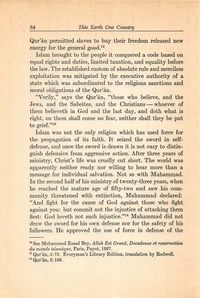 84 This Earth One Country
84 This Earth One Country
Qur’an permitted slaves to buy their freedom released new energy for the general good.”
Islam brought to the people it conquered a code based on equal rights and duties, limited taxation, and equality before the law. The established custom of absolute rule and merciless exploitation was mitigated by the executive authority of a state which was subordinated to the religious sanctions and moral obligations of the Qur’an.
“Verily,” says the Qur’an, “those who believe, and the Jews, and the Sabeites, and the Christians — whoever of them believeth in God and the last day, and doth what is right, on them shall come no fear, neither shall they be put to grief,’’1%
Islam was not the only religion which has used force for the propagation of its faith. It seized the sword in selfdefense, and once the sword is drawn it is not easy to distinguish defensive from aggressive action. After three years of ministry, Christ’s life was cruelly cut short. The world was apparently neither ready nor willing to hear more than a message for individual salvation. Not so with Muhammad. In the second half of his ministry of twenty-three years, when he reached the mature age of fifty-two and saw his community threatened with extinction, Muhammad declared: “And fight for the cause of God against those who fight against you: but commit not the injustice of attacking them first: God loveth not such injustice.”* Muhammad did not draw the sword for his own defense nor for the safety of his followers. He approved the use of force in defense of the
12 See Mohammed Essad Bey, Allah Est Grand, Decadence et resurrection du monde islamique, Paris, Payot, 1937.
® Qur’an, 5:73. Everyman’s Library Edition, translation by Rodwell.
“ Qur’dn, 2:186.
[Page 85]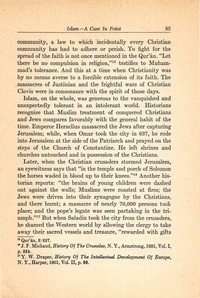 Islam —A Case In Point ‘ 85
Islam —A Case In Point ‘ 85
community, a law to which incidentally every Christian community has had to adhere or perish. To fight for the spread of the faith is not once mentioned in the Qur’an. “Let there be no compulsion in religion,’ testifies to Muhammad’s tolerance. And this at a time when Christianity was by no means averse to a forcible extension of its faith. The _massacres of Justinian and the frightful wars of Christian Clovis were in consonance with the spirit of those days. Islam, on the whole, was generous to the vanquished and unexpectedly tolerant in an intolerant world. Historians recognize that Muslim treatment of conquered Christians and Jews compares favorably with the general habit of the time. Emperor Heraclius massacred the Jews after capturing Jerusalem; while, when Omar took the city in 637, he rode into Jerusalem at the side of the Patriarch and prayed on the steps of the Church of Constantine. He left shrines and churches untouched and in possession of the Christians. Later, when the Christian crusaders stormed Jerusalem, an eyewitness says that “in the temple and porch of Solomon the horses waded in blood up to their knees.”?* Another historian reports: “the brains of young children were dashed out against the walls; Muslims were roasted at fires; the Jews were driven into their synagogue by the Christians, and there burnt; a massacre of nearly 70,000 persons took place; and the pope’s legate was seen partaking in the triumph.”’!? But when Saladin took the city from the crusaders, he shamed the Western world by allowing the clergy to take away their sacred vessels and treasure, “rewarded with gifts
- Qur’dn, 2:257.
- J.F. Michaud, History Of The Crusades, N. Y., Armstrong, 1881, Vol. I,
p. 224.
“Y. W. Draper, History Of The Intellectual Development Of Europe, N. Y., Harper, 1901, Vol. II, p. 22.
[Page 86]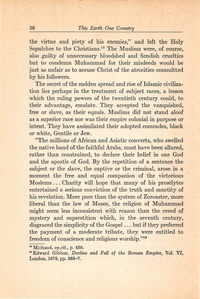 86 This Earth One Country
86 This Earth One Country
the virtue and piety of his enemies,” and left the Holy Sepulchre to the Christians.* The Muslims were, of course, also guilty of unnecessary bloodshed and fiendish cruelties but to condemn Muhammad for their misdeeds would be just as unfair as to accuse Christ of the atrocities committed by his followers.
The secret of the sudden spread and rise of Islamic civilization lies perhaps in the treatment of subject races, a lesson which the ruling powers of the twentieth century could, to their advantage, emulate. They accepted the vanquished, free or slave, as their equals. Muslims did not stand aloof as a superior race nor was their empire colonial in purpose or intent. They have assimilated their adopted comrades, black or white, Gentile or Jew.
“The millions of African and Asiatic converts, who swelled the native band of the faithful Arabs, must have been allured, rather than constrained, to declare their belief in one God and the apostle of God. By the repetition of a sentence the subject or the slave, the captive or the criminal, arose in a moment the free and equal companion of the victorious Moslems... Charity will hope that many of his proselytes entertained a serious conviction of the truth and sanctity of his revelation. More pure than the system of Zoroaster, more liberal than the law of Moses, the religion of Muhammad might seem less inconsistent with reason than the creed of mystery and superstition which, in the seventh century, disgraced the simplicity of the Gospel . . . but if they preferred the payment of a moderate tribute, they were entitled to freedom of conscience and religious worship.””?®
- Michaud, op.cit., p. 430.
- Edward Gibbon, Decline and Fall of the Roman Empire, Vol. VI,
London, 1872, pp. 366-7.
[Page 87]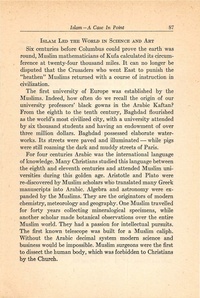 Islam —A Case In Point | 87
Islam —A Case In Point | 87
Isnam Lep tur Word IN SCIENCE AND ART
Six centuries before Columbus could prove the earth was round, Muslim mathematicians of Kufa calculated its circumference at twenty-four thousand miles. It can no longer be disputed that the Crusaders who went East to punish the “heathen” Muslims returned with a course of instruction in civilization.
The first university of Europe was established by the Muslims. Indeed, how often do we recall the origin of our university professors’ black gowns in the Arabic Kaftan? From the eighth to the tenth century, Baghdad flourished as the world’s most civilized city, with a university attended by six thousand students and having an endowment of over three million dollars. Baghdad possessed elaborate waterworks. Its streets were paved and illuminated — while pigs were still roaming the dark and muddy streets of Paris.
For four centuries Arabic was the international language
of knowledge. Many Christians studied this language between
the eighth and eleventh centuries and attended Muslim universities during this golden age. Aristotle and Plato were
re-discovered by Muslim scholars who translated many Greek
manuscripts into Arabic. Algebra and astronomy were expanded by the Muslims. They are the originators of modern
chemistry, meteorology and geography. One Muslim travelled
for forty years collecting mineralogical specimens, while
another scholar made botanical observations over the entire
Muslim world. They had a passion for intellectual pursuits.
The first known telescope was built for a Muslim caliph.
Without the Arabic decimal system modern science and
business would be impossible. Muslim surgeons were the first
to dissect the human body, which was forbidden to Christians
by the Church.
[Page 88]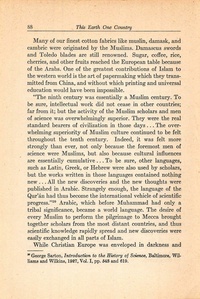 88 _ This Earth One Country
88 _ This Earth One Country
Many of our finest cotton fabrics like muslin, damask, and cambric were originated by the Muslims. Damascus swords and Toledo blades are still renowned. Sugar, coffee, rice, cherries, and other fruits reached the European table because of the Arabs. One of the greatest contributions of Islam to the western world is the art of papermaking which they transmitted from China, and without which printing and universal education would have been impossible.
“The ninth century was essentially a Muslim century. To be sure, intellectual work did not cease in other countries; far from it; but the activity of the Muslim scholars and men of science was overwhelmingly superior. They were the real standard bearers of civilization in those days...The overwhelming superiority of Muslim culture continued to be felt throughout the tenth century. Indeed, it was felt more strongly than ever, not only because the foremost men of science were Muslims, but also because cultural influences are essentially cumulative...To be sure, other languages, such as Latin, Greek, or Hebrew were also used by scholars, but the works written in those languages contained nothing new ...All the new discoveries and the new thoughts were published in Arabic. Strangely enough, the language of the Qur’4n had thus become the international vehicle of scientific progress.”*° Arabic, which before Muhammad had only a tribal significance, became a world language. The desire of every Muslim to perform the pilgrimage to Mecca brought together scholars from the most distant countries, and thus scientific knowledge rapidly spread and new discoveries were easily exchanged in all parts of Islam.
While Christian Europe was enveloped in darkness and
- George Sarton, Introduction to the History of Science, Baltimore, Williams and Wilkins, 1927, Vol. I, pp. 43 and 619.
[Page 89]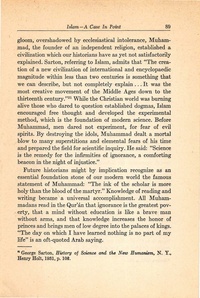 Islam —A Case In Point 89
Islam —A Case In Point 89
gloom, overshadowed by ecclesiastical intolerance, Muhammad, the founder of an independent religion, established a civilization which our historians have as yet not satisfactorily explained. Sarton, referring to Islam, admits that “The creation of a new civilization of international and encyclopaedic magnitude within less than two centuries is something that we can describe, but not completely explain ...It was the most creative movement of the Middle Ages down to the thirteenth century.” While the Christian world was burning alive those who dared to question established dogmas, Islam encouraged free thought and developed the experimental method, which is the foundation of modern science. Before Muhammad, men dared not experiment, for fear of evil spirits. By destroying the idols, Muhammad dealt a mortal blow to many superstitions and elemental fears of his time and prepared the field for scientific inquiry. He said: “Science is the remedy for the infirmities of ignorance, a comforting beacon in the night of injustice.”
Future historians might by implication recognize as an essential foundation stone of our modern world the famous statement of Muhammad: “The ink of the scholar is more holy than the blood of the martyr.” Knowledge of reading and writing became a universal accomplishment. All Muhammadans read in the Qur’an that ignorance is the greatest pov-erty, that a mind without education is like a brave man without arms, and that knowledge increases the honor of princes and brings men of low degree into the palaces of kings. “The day on which I have learned nothing is no part of my life” is an oft-quoted Arab saying.
® George Sarton, History of Science and the New Humanism, N. Y.,
Henry Holt, 1931, p. 102.
[Page 90]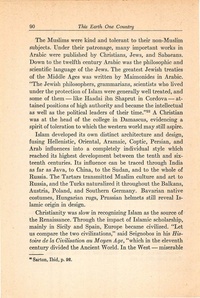 SS ee ee eee ee oa. sn eee — 2
SS ee ee eee ee oa. sn eee — 2
90 This Earth One Country
The Muslims were kind and tolerant to their non-Muslim subjects. Under their patronage, many important works in Arabic were published by Christians, Jews, and Sabaeans. Down to the twelfth century Arabic was the philosophic and scientific language of the Jews. The greatest Jewish treaties of the Middle Ages was written by Maimonides in Arabic. “The Jewish philosophers, grammarians, scientists who lived under the protection of Islam were generally well treated, and some of them — like Hasdai ibn Shaprut in Cordova — attained positions of high authority and became the intellectual as well as the political leaders of their time.” A Christian was at the head of the college in Damascus, evidencing a spirit of toleration to which the western world may still aspire.
Islam developed its own distinct architecture and design, fusing Hellenistic, Oriental, Aramaic, Coptic, Persian, and Arab influences into a completely individual style which reached its highest development between the tenth and sixteenth centuries. Its influence can be traced through India as far as Java, to China, to the Sudan, and to the whole of Russia. The Tartars transmitted Muslim culture and art to Russia, and the Turks naturalized it throughout the Balkans, Austria, Poland, and Southern Germany. Bavarian native costumes, Hungarian rugs, Prussian helmets still reveal Islamic origin in design.
‘Christianity was slow in recognizing Islam as the source of the Renaissance. Through the impact of Islamic scholarship, mainly in Sicily and Spain, Europe became civilized. “Let us compare the two civilizations,” said Seignobos in his Histoire de la Civilisation au Moyen Age, “which in the eleventh century divided the Ancient World. In the West — miserable
- Sarton, Ibid, p. 92.
[Page 91]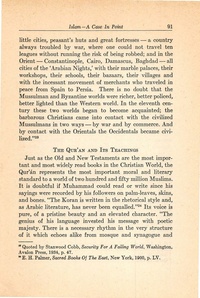 Islam —A Case In Point 91
Islam —A Case In Point 91
little cities, peasant’s huts and great fortresses — a country always troubled by war, where one could not travel ten leagues without running the risk of being robbed; and in the Orient — Constantinople, Cairo, Damascus, Baghdad — all cities of the ‘Arabian Nights,’ with their marble palaces, their workshops, their schools, their bazaars, their villages and with the incessant movement of merchants who traveled in peace from Spain to Persia. There is no doubt that the Mussulman and Byzantine worlds were richer, better policed, better lighted than the Western world. In the eleventh century these two worlds began to become acquainted; the barbarous Christians came into contact with the civilized Mussulmans in two ways— by war and by commerce. And by contact with the Orientals the Occidentals became civilized.”?8
Tue Qur’an AND Its TEACHINGS
Just as the Old and New Testaments are the most important and most widely read books in the Christian World, the Qur’an represents the most important moral and literary standard to a world of two hundred and fifty million Muslims. It is doubtful if Muhammad could read or write since his sayings were recorded by his followers on palm-leaves, skins, and bones, “The Koran is written in the rhetorical style and, as Arabic literature, has never been equalled.’’** Its voice is pure, of a pristine beauty and an elevated character. “The genius of his language invested his message with poetic majesty. There is a necessary rhythm in the very structure of it which echoes alike from mosque and synagogue and
- Quoted by Stanwood Cobb, Security For A Failing World, Washington,
Avalon Press, 1934, p. 47.
“EH. Palmer, Sacred Books Of The East, New York, 1900, p. LV.
[Page 92]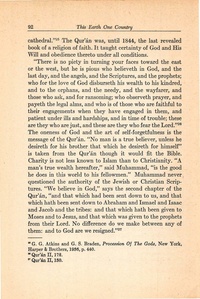 92 This Earth One Country
92 This Earth One Country
cathedral.””> The Qur’an was, until 1844, the last revealed book of a religion of faith. It taught certainty of God and His Will and obedience thereto under all conditions.
“There is no piety in turning your faces toward the east or the west, but he is pious who believeth in God, and the last day, and the angels, and the Scriptures, and the prophets; who for the love of God disburseth his wealth to his kindred, and to the orphans, and the needy, and the wayfarer, and those who ask, and for ransoming; who observeth prayer, and payeth the legal alms, and who is of those who are faithful to their engagements when they have engaged in them, and patient under ills and hardships, and in time of trouble; these are they who are just, and these are they who fear the Lord.””6 The oneness of God and the art of self-forgetfulness is the message of the Qur’an. “No man is a true believer, unless he desireth for his brother that which he desireth for himself” is taken from the Qur’an though it would fit the Bible. Charity is not less known to Islam than to Christianity. “A man’s true wealth hereafter,” said Muhammad, “is the good he does in this world to his fellowmen.” Muhammad never, questioned the authority of the Jewish or Christian Scriptures. “We believe in God,” says the second chapter of the Qur’4n, “and that which had been sent down to us, and that which hath been sent down to Abraham and Ismael and Isaac and Jacob and the tribes: and that which hath been given to Moses and to Jesus, and that which was given to the prophets from their Lord. No difference do we make between any of them: and to God are we resigned.”?"
- @. G. Atkins and G. S. Braden, Procession Of The Gods, New York,
Harper & Brothers, 1986, p. 440.
- Qur’én II, 172.
- Qur’dn I, 180.
[Page 93]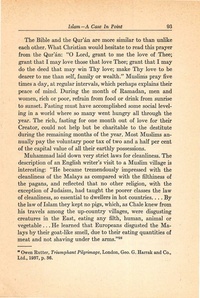 Islam —A Case In Point 93
Islam —A Case In Point 93
The Bible and the Qur’4n are more similar to than unlike each other. What Christian would hesitate to read this prayer from the Qur’4n: “O Lord, grant to me the love of Thee; grant that I may love those that love Thee; grant that I may do the deed that may win Thy love; make Thy love to be dearer to me than self, family or wealth.” Muslims pray five times a day, at regular intervals, which perhaps explains their peace of mind. During the month of Ramadan, men and women, rich or poor, refrain from food or drink from sunrise to sunset. Fasting must have accomplished some social leveling in a world where so many went hungry all through the year. The rich, fasting for one month out of love for their Creator, could not help but be charitable to the destitute during the remaining months of the year. Most Muslims annually pay the voluntary poor tax of two and a half per cent of the capital value of all their earthly possessions,
Muhammad laid down very strict laws for cleanliness. The description of an English writer’s visit to a Muslim village is interesting: “He became tremendously impressed with the cleanliness of the Malays as compared with the filthiness of the pagans, and reflected that no other religion, with the exception of Judaism, had taught the poorer classes the law of cleanliness, so essential to dwellers in hot countries. ... By the law of Islam they kept no pigs, which, as Chale knew from his travels among the up-country villages, were disgusting creatures in the East, eating any filth, human, animal or vegetable... He learned that Europeans disgusted the Malays by their goat-like smell, due to their eating quantities of meat and not shaving under the arms.”*8
- Owen Rutter, Triwmphant Pilgrimage, London, Geo. G. Harrak and Co.,
Ltd., 1937, p. 36.
[Page 94]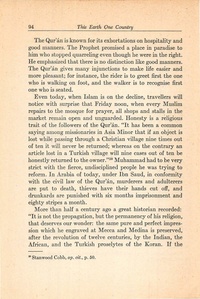 94 This Earth One Country
94 This Earth One Country
The Qur’an is known for its exhortations on hospitality and good manners. The Prophet promised a place in paradise to him who stopped quarreling even though he were in the right. He emphasized that there is no distinction like good manners. The Qur’an gives many injunctions to make life easier and more pleasant; for instance, the rider is to greet first the one who is walking on foot, and the walker is to recognise first one who is seated.
Even today, when Islam is on the decline, travellers will notice with surprise that Friday noon, when every Muslim repairs to the mosque for prayer, all shops and stalls in the market remain open and unguarded. Honesty is a religious trait of the followers of the Qur’an. “It has been a common saying among missionaries in Asia Minor that if an object is lost while passing through a Christian village nine times out of ten it will never be returned; whereas on the contrary an article lost in a Turkish village will nine cases out of ten be honestly returned to the owner.”*® Muhammad had to be very strict with the fierce, undisciplined people he was trying to reform. In Arabia of today, under Ibn Saud, in conformity with the civil law of the Qur’4n, murderers and adulterers are put to death, thieves have their hands cut off, and drunkards are punished with six months imprisonment and eighty stripes a month.
More than half a century ago a great historian recorded: “Tt is not the propagation, but the permanency of his religion, that deserves our wonder: the same pure and perfect impression which he engraved at Mecca and Medina is preserved, after the revolution of twelve centuries, by the Indian, the African, and the Turkish proselytes of the Koran. If the
- Stanwood Cobb, op. cit., p. 50.
Islam —A Case In Point ; 95
Christian apostles, St. Peter or St. Paul, could return to the Vatican, they might possibly inquire the name of the Deity who is worshipped with such mysterious rites in that magnificent temple... But the Turkish dome of St. Sophia, with an increase of splendour and size, represents the humble tabernacle erected at Medina by the hands of Muhammad.’”®°
Women in Isuam
Polygamy was very common in primitive societies. Frequent wars, excess of women and their usefulness as laborers, established polygamy among pastoral and agricultural people. In the time of Muhammad polygamy or concubinage were universally practiced. Moses did not impose any limit on the number of wives for one man. Only later did the Talmud counsel that a man should have no more wives than he could properly maintain. Not until the eleventh century A. D. was polygamy prohibited among the Jews. An Athenian could have an many wives as he wanted, and a high-caste Brahmin, ‘even today, is free to marry all the wives he chooses. The Roman State gave legal sanction to the institution of concubinage, and so did China until as recently as 1931.
Christ did not forbid the universal practice of polygamy. Concubinage was sanctioned by the Synod of Toledo in 400 A.D. and was not suppressed until the fifth Lateran Council in 1516.** Early Christian emperors, nobles, and priests were known as polygamists. Charlemagne, among other Merovingian kings, had two wives and several concubines. Centuries later, Philip of Hesse and Frederick William IL of Prussia entered bigamous marriages with the sanction of the
- ° Edward Gibbon, Decline and Fall of the Roman Empire, 1872. Vol. VI,
p. 282.
“W.F. Bade, The Old Testament in the Light of Today, pp. 52-53.
[Page 96]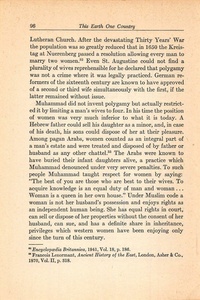 96 This Earth One Country
96 This Earth One Country
Lutheran Church. After the devastating Thirty Years’ War the population was so greatly reduced that in 1650 the Kreistag at Nuerenberg passed a resolution allowing every man to marry two women.” Even St. Augustine could not find a plurality of wives reprehensible for he declared that polygamy was not a crime where it was legally practiced. German re-_ formers of the sixteenth century are known to have approved of a second or third wife simultaneously with the first, if the latter remained without issue.
Muhammad did not invent polygamy but actually restricted it by limiting a man’s wives to four. In his time the position of women was very much inferior to what it is today. A Hebrew father could sell his daughter as a minor, and, in case of his death, his sons could dispose of her at their pleasure. Among pagan Arabs, women counted as an integral part of » a man’s estate and were treated and disposed of by father or husband as any other chattel.2* The Arabs were known to have buried their infant daughters alive, a practice which Muhammad denounced under very severe penalties. To such people Muhammad taught respect for women by saying: “The best of you are those who are best to their wives. To acquire knowledge is an equal duty of man and woman... Woman is a queen in her own house.” Under Muslim code a woman is not her husband’s possession and enjoys rights as an independent human being. She has equal rights in court, can sell or dispose of her properties without the consent of her husband, can sue, and has a definite share in inheritance, privileges which western women have been enjoying only since the turn of this century.
" Encyclopedia Britannica, 1941, Vol. 18, p. 186.
- Francois Lenormant, Ancient History of the East, London, Asher & Co.,
1870, Vol. I, p. 318.
[Page 97]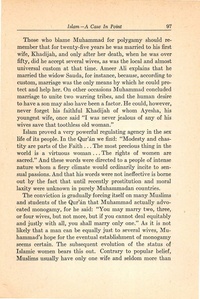 Islam —A Case In Point 97
Islam —A Case In Point 97
Those who blame Muhammad for polygamy should remember that for twenty-five years he was married to his first wife, Khadijah, and only after her death, when he was over fifty, did he accept several wives, as was the local and almost universal custom at that time. Ameer Ali explains that he married the widow Sauda, for instance, because, according to custom, marriage was the only means by which he could protect and help her. On other occasions Muhammad concluded marriage to unite two warring tribes, and the human desire to have a son may also have been a factor. He could, however, never forget his faithful Khadijah of whom Ayesha, his youngest wife, once said “I was never jealous of any of his wives save that toothless old woman.”
Islam proved a very powerful regulating agency in the sex life of its people. In the Qur’an we find: “Modesty and chastity are parts of the Faith ...The most precious thing in the world is a virtuous woman...The rights of women are sacred.” And these words were directed to a people of intense nature whom a fiery climate would ordinarily incite to sensual passions. And that his words were not ineffective is borne out by the fact that until recently prostitution and moral laxity were unknown in purely Muhammadan countries.
The conviction is gradually forcing itself on many Muslims
and students of the Qur’4n that Muhammad actually advo‘cated monogamy, for he said: “You may marry two, three,
or four wives, but not more, but if you cannot deal equitably
and justly with all, you shall marry only one.” As it is not
likely that a man can be equally just to several wives, Muhammad’s hope for the eventual establishment of monogamy
seems certain. The subsequent evolution of the status of
Islamic women bears this out. Contrary to popular belief,
Muslims usually have only one wife and seldom more than
[Page 98]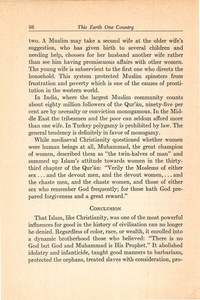
98 This Earth One Country
two. A Muslim may take a second wife at the older wife’s suggestion, who has given birth to several children and needing help, chooses for her husband another wife rather than see him having promiscuous affairs with other women. The young wife is subservient to the first one who directs the household. This system protected Muslim spinsters from frustration and poverty which is one of the causes of prostitution in the western world.
In India, where the largest Muslim community counts about eighty million followers of the Qur’dn, ninety-five per cent are by necessity or conviction monogamous. In the Middle East the tribesmen and the poor can seldom afford more than one wife. In Turkey polygamy is prohibited by law. The general tendency is definitely in favor of monogamy.
While mediaeval Christianity questioned whether women ~ were human beings at all, Muhammad, the great champion of women, described them as “the twin-halves of man” and summed up Islam’s attitude towards women in the thirtythird chapter of the Qur’an: “Verily the Moslems of either sex ...and the devout men, and the devout women,...and the chaste men, and the chaste women, and those of either sex who remember God frequently; for these hath God prepared forgiveness and a great reward.”
CoNCLUSION
That Islam, like Christianity, was one of the most powerful
influences for good in the history of civilization can no longer
be denied. Regardless of color, race, or wealth, it enrolled into
a dynamic brotherhood those who believed: “There is no
God but God and Muhammad is His Prophet.” It abolished
idolatry and infanticide, taught good manners to barbarians,
protected the orphans, treated slaves with consideration, pro[Page 99]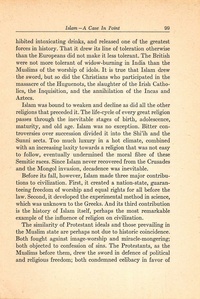 Islam —A Case In Point 99
Islam —A Case In Point 99
hibited intoxicating drinks, and released one of the greatest forces in history. That it drew its line of toleration otherwise than the Europeans did not make it less tolerant. The British were not more tolerant of widow-burning in India than the Muslims of the worship of idols. It is true that Islam drew the sword, but so did the Christians who participated in the massacre of the Huguenots, the slaughter of the Irish Catholies, the Inquisition, and the annihilation of the Incas and Aztecs.
Islam was bound to weaken and decline as did all the other religions that preceded it. The life-cycle of every great religion passes through the inevitable stages of birth, adolescence, maturity, and old age. Islam was no exception. Bitter controversies over succession divided it into the Shi’ih and the Sunni sects. Too much luxury in a hot climate, combined with an increasing laxity towards a religion that was not easy to follow, eventually undermined the moral fibre of these Semitic races. Since Islam never recovered from the Crusades and the Mongol invasion, decadence was inevitable.
Before its fall, however, Islam made three major contributions to civilization. First, it created a nation-state, guaranteeing freedom of worship and equal rights for all before the law. Second, it developed the experimental method in science, which was unknown to the Greeks. And its third contribution is the history of Islam itself, perhaps the most remarkable example of the influence of religion on civilization.
The similarity of Protestant ideals and those prevailing in
the Muslim state are perhaps not due to historic coincidence.
Both fought against image-worship and miracle-mongering;
both objected to confession of sins. The Protestants, as the
Muslims before them, drew the sword in defence of political
and religious freedom; both condemned celibacy in favor of
[Page 100]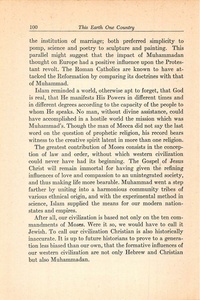 100 This Earth One Country
100 This Earth One Country
the institution of marriage; both preferred simplicity to pomp, science and poetry to sculpture and painting. This parallel might suggest that the impact of Muhammadan thought on Europe had a positive influence upon the Protestant revolt. The Roman Catholics are known to have attacked the Reformation by comparing its doctrines with that of Muhammad.
Islam reminded a world, otherwise apt to forget, that God is real, that He manifests His Powers in different times and in different degrees according to the capacity of the people to whom He speaks. No man, without divine assistance, could have accomplished in a hostile world the mission which was Muhammad’s. Though the man of Mecca did not say the last word on the question of prophetic religion, his record bears witness to the creative spirit latent in more than one religion.
The greatest contribution of Moses consists in the conception of law and order, without which western civilization could never have had its beginning. The Gospel of Jesus Christ will remain immortal for having given the refining influences of love and compassion to an unintegrated society, and thus making life more bearable. Muhammad went a step farther by uniting into a harmonious community tribes of various ethnical origin, and with the experimental method in science, Islam supplied the means for our modern nationstates and empires.
After all, our civilization is based not only on the ten commandments of Moses. Were it so, we would have to eall it
Jewish. To call our civilization Christian is also historically
inaccurate. It is up to future historians to prove to a generation less biased than our own, that the formative influences of
our western civilization are not only Hebrew and Christian
but also Muhammadan.
[Page 101]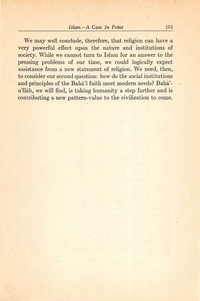 Islam —A Case In Point 101
Islam —A Case In Point 101
We may well conclude, therefore, that religion can have a very powerful effect upon the nature and institutions of society. While we cannot turn to Islam for an answer to the pressing problems of our time, we could logically expect assistance from a new statement of religion. We need, then, to consider our second question: how do the social institutions and principles of the Baha’i faith meet modern needs? Baha’ullah, we will find, is taking humanity a step farther and is contributing a new pattern-value to the civilization to come.
